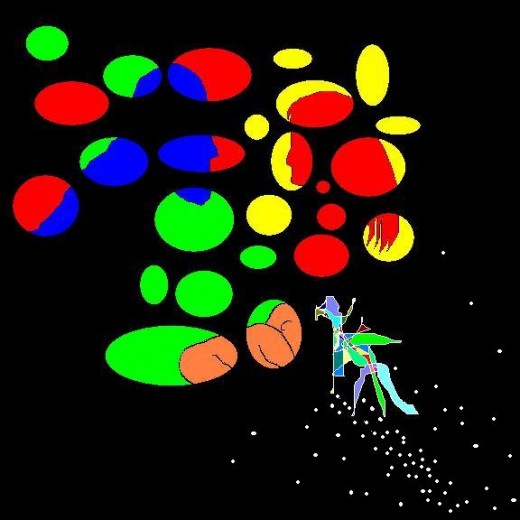Fanatics- The last word in failure
What you can see of any ideology is always filtered by something

The working machines of oppression, or just fools?
A fanatic, by definition, is a person without ideas or logic. Fanatics abrogate the right to their own thinking. Someone else does the thinking for them. An ideology, belief, or some sort of political orientation is all that’s required to turn a thinking person into a zombie. Extremes of fanaticism aren’t hard to find in history. The Nazis, communists, and of course those adorable terrorists the world simply can’t do without are all great cases.
Fanaticism is based on the inability of people to understand their own thinking. Like a new born chicken thinking a truck is its mother, the fanatic will follow. Political and religious fanaticism is supported by repetition. Uniformity, and providing an environment which is novel to most misanthropes because for once they’re members of something, is another working mechanism.
Fuhrer befehl, wir folgen (Fuhrer order, we will follow) was just one of many Nazi slogans which was used as a basic orientation. Sieg Heil (Hail victory) was another. You’ll notice that neither of these statements includes any qualifiers. Repeated endlessly, they’re actual programming devices. A German surgeon in World War 2 reported that when operating on an unconscious SS soldier, the soldier was repeating Sieg Heil, while under full anesthesia.
That’s exactly how penetrant these very simple programming devices are. They don’t work on everybody, thankfully, but they do work on some people very well.
The communist version was more visual, and more rhetorical. This form of fanaticism could even overcome the concept of absurdity. The statement “Defend the glorious decision to build a new tractor” wasn’t considered idiotic, it was seen as idiomatic. The requirement to look like the strange communist posters where everybody stared heroically at a non-existent horizon was almost an emotional uniform in itself. People were forced to write self-criticism essays about their bad attitudes, if not actually being slaughtered or tortured to death.
The visual element in fanaticism is like a sort of perverted Zen. Everything has to be related to the ideology. If the sky is blue, it has to be considered a political statement, or the result of the metabolism of the leader of the movement. All problems are the result of the enemies of the regime, all blessings are derived from the regime.
The visual element, however, is also the start of the violent aspects of fanaticism. An enemy is identified, which of course involves visual cues. There’s no point in identifying a non- existent enemy, so the manufacturers of fanatics provide targets. These are focal points, and they’re also subconscious triggers. Whether the enemy is black, white, red, green, blue, Catholic, Protestant, Jewish or Muslim, rich, poor or anything else, the “protagonist” effect is operational.
The fanatic, whose personal judgment is completely short-circuited, can’t exercise objective thought or extended logic outside the parameters of whatever ideology or belief is involved. Even contradictions in ideologies are explained, by, you guessed, ideology.
Fanatics will do whatever this bastardized thinking permits. They can’t question, because “We will follow” is now hardwired into their reflexes.
There are payoffs for fanatics in this mode, like these bizarre incidents:
- In Cornelius Ryan’s book The Last Battle, as the Russians approached Berlin, a bizarre character described as a “fanatical Luftwaffe accountant” conducted his daily ritual of arriving at the breakfast table in a tailored uniform covered in fictitious medals, yelled Sieg Heil at his wife, and instructed her to shoot herself before the Russians arrived. He then disappeared forever.
- In Algeria, a group of self proclaimed jihadis conducted massacres, etc as per usual until the public turned against them. They then retreated into the desert and wiped themselves out on the basis of ideological differences.
- Hans von Luck, a German panzer commander was fighting outside Berlin when von Ribbentrop, the mediocre German Foreign Minister, arrived with his entourage. Von Ribbentrop asked von Luck if he thought it was possible the Russians would attack Berlin. Von Luck, carefully phrasing his words, said he thought it was. Von Ribbentrop was astonished, even with the obvious signs of one of the world’s worst wars all around. After von Ribbentrop left, von Luck and his friends were in virtual hysterics of laughter. (From von Luck’s impossibly interesting and quite un-putdownable book, Panzer Commander)
A true fanatic will not consider the effects of their beliefs. They are incapable of foreseeing failure. That may be why all fanatical organizations eventually collapse.



